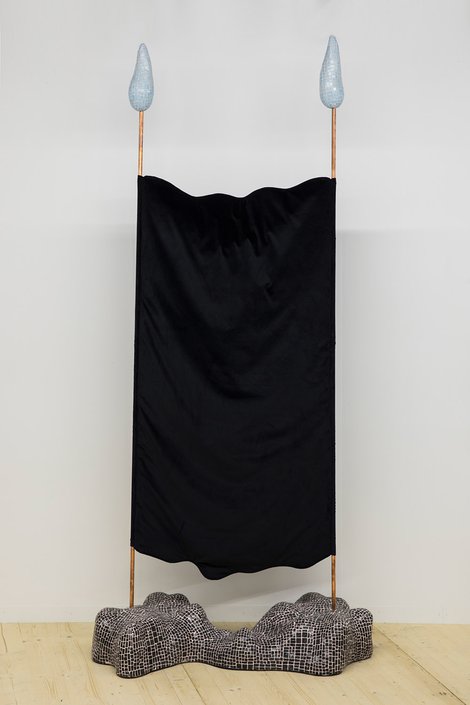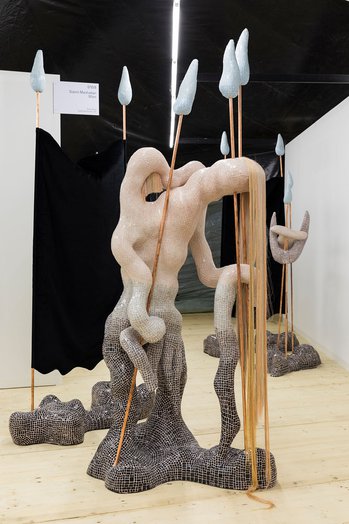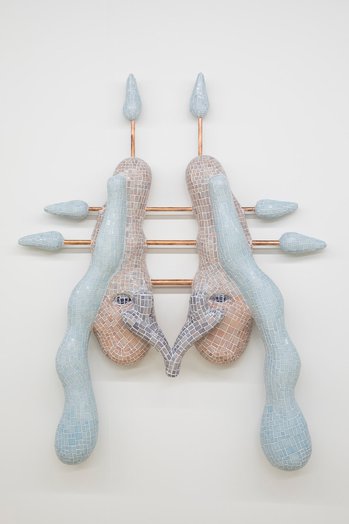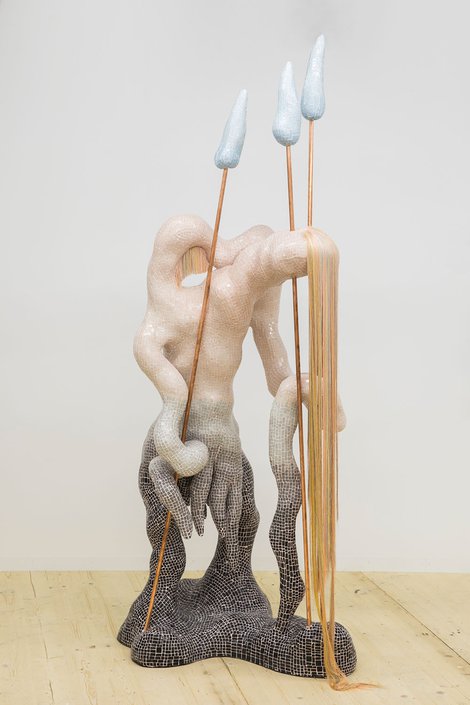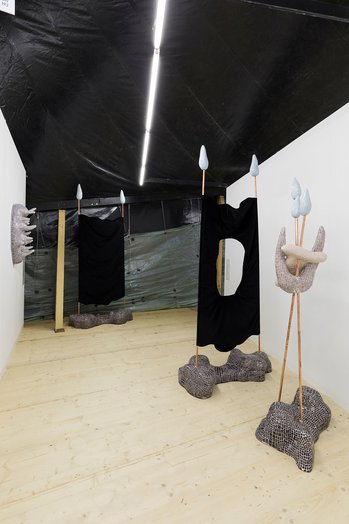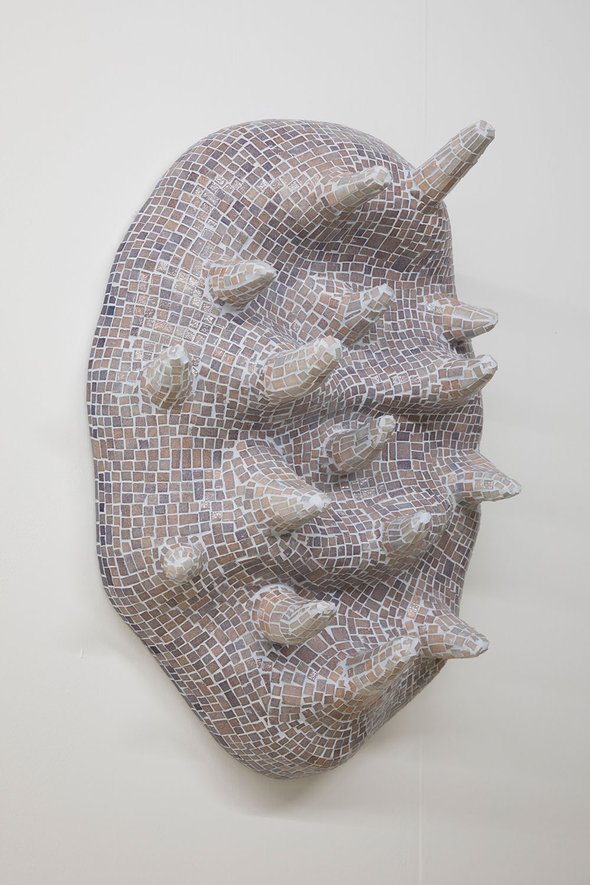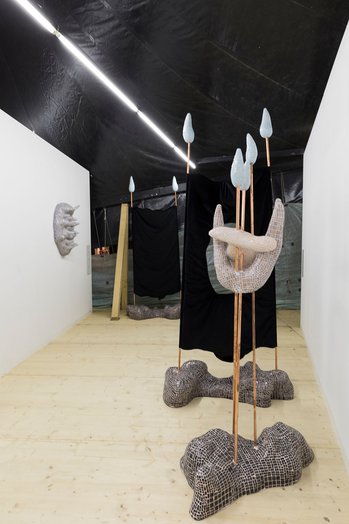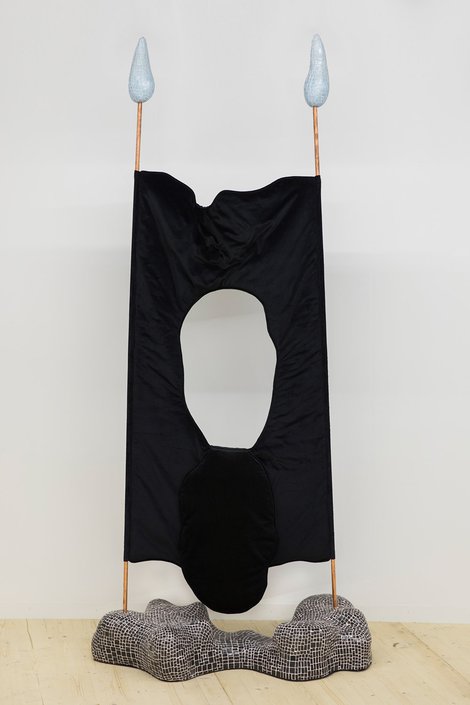Liste 2018
Zsófia Keresztes
Zsófia Keresztes
Zsófia Keresztes (b. 1985 in Budapest, Hungary) makes avatars. Her monuments to digital glitches are speculations on how the real world extends into virtuality. Keresztes treats the virtual as something that is “as if” it was real, establishing scenarios for how digital infestation becomes incarnated, how algorithms and digital avatars manifest themselves in the world and cannibalise sensation and perception.
Her avatars, understood as both its sacred and digital denotations are the by-product of lonely dinners in front of a computer, surrounded by a virtual and augmented reality and the narcissism of social media, the constant bombardment of images, desires, the Tantalos promise of fulfilment that is never redeemed.
And yet we live in a culture that seems obsessed with eradicating boredom, as if it were a global poverty, and replacing it with a peculiar modern form of active idleness oozing from our glowing screens. Kierkegaard defines boredom as a sense of emptiness and examines it not as an absence of stimulation but as an absence of meaning — an idea that also explains why it’s possible, today more than ever, to be overstimulated but existentially bored.
The results of this overstimulated boredom fascinate Keresztes – Her avatars inhabit space, waiting, all drive and desire but essentially useless. Algorithms are programmed to predict the next steps but without the promise of a wholesome future. These characters are endlessly repeating algorithms, feeding off their preprogramed desire and inexhaustible feedback loops. The booth becomes a waiting room for the characters obsessed with the passing of time and predicting a future, consumed and incarnated into refuge by excessive cyberchondria and esotericism.
Her avatars, understood as both its sacred and digital denotations are the by-product of lonely dinners in front of a computer, surrounded by a virtual and augmented reality and the narcissism of social media, the constant bombardment of images, desires, the Tantalos promise of fulfilment that is never redeemed.
And yet we live in a culture that seems obsessed with eradicating boredom, as if it were a global poverty, and replacing it with a peculiar modern form of active idleness oozing from our glowing screens. Kierkegaard defines boredom as a sense of emptiness and examines it not as an absence of stimulation but as an absence of meaning — an idea that also explains why it’s possible, today more than ever, to be overstimulated but existentially bored.
The results of this overstimulated boredom fascinate Keresztes – Her avatars inhabit space, waiting, all drive and desire but essentially useless. Algorithms are programmed to predict the next steps but without the promise of a wholesome future. These characters are endlessly repeating algorithms, feeding off their preprogramed desire and inexhaustible feedback loops. The booth becomes a waiting room for the characters obsessed with the passing of time and predicting a future, consumed and incarnated into refuge by excessive cyberchondria and esotericism.

11.06.18—17.06.18
Burgweg 15, 4058 Basel, Switzerland
> Installation views
Zsófia Keresztes (b. 1985 in Budapest, Hungary) makes avatars. Her monuments to digital glitches are speculations on how the real world extends into virtuality. Keresztes treats the virtual as something that is “as if” it was real, establishing scenarios for how digital infestation becomes incarnated, how algorithms and digital avatars manifest themselves in the world and cannibalise sensation and perception.
Her avatars, understood as both its sacred and digital denotations are the by-product of lonely dinners in front of a computer, surrounded by a virtual and augmented reality and the narcissism of social media, the constant bombardment of images, desires, the Tantalos promise of fulfilment that is never redeemed.
And yet we live in a culture that seems obsessed with eradicating boredom, as if it were a global poverty, and replacing it with a peculiar modern form of active idleness oozing from our glowing screens. Kierkegaard defines boredom as a sense of emptiness and examines it not as an absence of stimulation but as an absence of meaning — an idea that also explains why it’s possible, today more than ever, to be overstimulated but existentially bored.
The results of this overstimulated boredom fascinate Keresztes – Her avatars inhabit space, waiting, all drive and desire but essentially useless. Algorithms are programmed to predict the next steps but without the promise of a wholesome future. These characters are endlessly repeating algorithms, feeding off their preprogramed desire and inexhaustible feedback loops. The booth becomes a waiting room for the characters obsessed with the passing of time and predicting a future, consumed and incarnated into refuge by excessive cyberchondria and esotericism.
Her avatars, understood as both its sacred and digital denotations are the by-product of lonely dinners in front of a computer, surrounded by a virtual and augmented reality and the narcissism of social media, the constant bombardment of images, desires, the Tantalos promise of fulfilment that is never redeemed.
And yet we live in a culture that seems obsessed with eradicating boredom, as if it were a global poverty, and replacing it with a peculiar modern form of active idleness oozing from our glowing screens. Kierkegaard defines boredom as a sense of emptiness and examines it not as an absence of stimulation but as an absence of meaning — an idea that also explains why it’s possible, today more than ever, to be overstimulated but existentially bored.
The results of this overstimulated boredom fascinate Keresztes – Her avatars inhabit space, waiting, all drive and desire but essentially useless. Algorithms are programmed to predict the next steps but without the promise of a wholesome future. These characters are endlessly repeating algorithms, feeding off their preprogramed desire and inexhaustible feedback loops. The booth becomes a waiting room for the characters obsessed with the passing of time and predicting a future, consumed and incarnated into refuge by excessive cyberchondria and esotericism.
